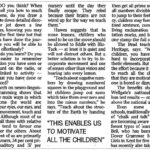Student demotivation is a pervasive issue in modern education, causing frustration for students, educators, and communities alike. However, this demotivation isn’t an inevitable consequence of modern society or a reflection of student apathy. Rather, it’s a symptom of a disconnect between current educational practices and the fundamental principles of learning. The good news is that A Will To Learn is inherent in every student, and it can be nurtured through thoughtful and practical strategies.
Understanding the Foundation of A Will to Learn
At the core of motivated learning lies a set of key realities often overlooked in today’s educational landscape:
- Innate Desire to Learn: Every student possesses an intrinsic desire to learn. This inherent curiosity needs to be recognized and fostered.
- Harmony of Achievement and Well-being: Productive learning environments are not solely focused on academic achievement. They prioritize student well-being, recognizing the interconnectedness of academic success and emotional health. A supportive learning environment contributes directly to a student’s will to learn.
- Teacher Influence: Educators wield significant influence over student motivation. Their actions, attitudes, and teaching methods can either ignite or extinguish a student’s will to learn.
- Simplicity of Effective Strategies: The most impactful strategies for cultivating student motivation are often straightforward and readily implementable. Focusing on core principles can unlock a student’s inherent a will to learn.
Cultivating A Will to Learn: Practical Strategies
Dave Stuart Jr., in his insightful book “The Will to Learn,” offers a refreshing perspective on student motivation, providing educators with actionable tools and techniques. He outlines:
- Five Core Beliefs: Stuart identifies five foundational beliefs that underpin motivated learning, providing a framework for understanding how students engage with their education and how to tap into their will to learn.
- Ten High-Impact Methods: The book presents ten practical, low-effort strategies that teachers can employ to foster student motivation across diverse classroom settings and throughout the academic year. These methods directly address the core beliefs to inspire a will to learn.
- Addressing Common Challenges: Stuart tackles over fifty common obstacles that teachers and students encounter in the realm of motivation, offering solutions and guidance for navigating these challenges effectively. This empowers educators to remove barriers and instill a will to learn.
Key Takeaways for Fostering A Will to Learn
“The Will to Learn” delves into critical aspects of motivation, including:
- The limitations of solely relying on social-emotional learning (SEL) approaches. While valuable, SEL alone doesn’t fully address the complexities of student motivation.
- The importance of framing student motivation as a matter of belief. Students’ beliefs about their abilities, the value of learning, and their place in the classroom profoundly impact their motivation. Instilling positive beliefs is key to fostering a will to learn.
- Practical techniques for building student-teacher relationships based on value, knowledge, and respect. These relationships provide the foundation for a supportive learning environment where students feel empowered to learn.
- Strategies for improving teaching skills and creating engaging lessons that minimize downtime. Dynamic instruction keeps students focused and reinforces their will to learn.
- Methods for fostering a knowledge-rich environment and helping students value the process of learning. When students understand the value of what they are learning, their will to learn increases exponentially.
Conclusion: Empowering Students Through A Will to Learn
“The Will to Learn” provides a comprehensive guide for understanding and cultivating student motivation. By addressing the fundamental beliefs that drive engagement, the book equips educators with practical strategies to create learning environments where students thrive. Fostering a will to learn is not just about improving academic performance; it’s about empowering students to become lifelong learners who embrace challenges and find joy in the pursuit of knowledge.

